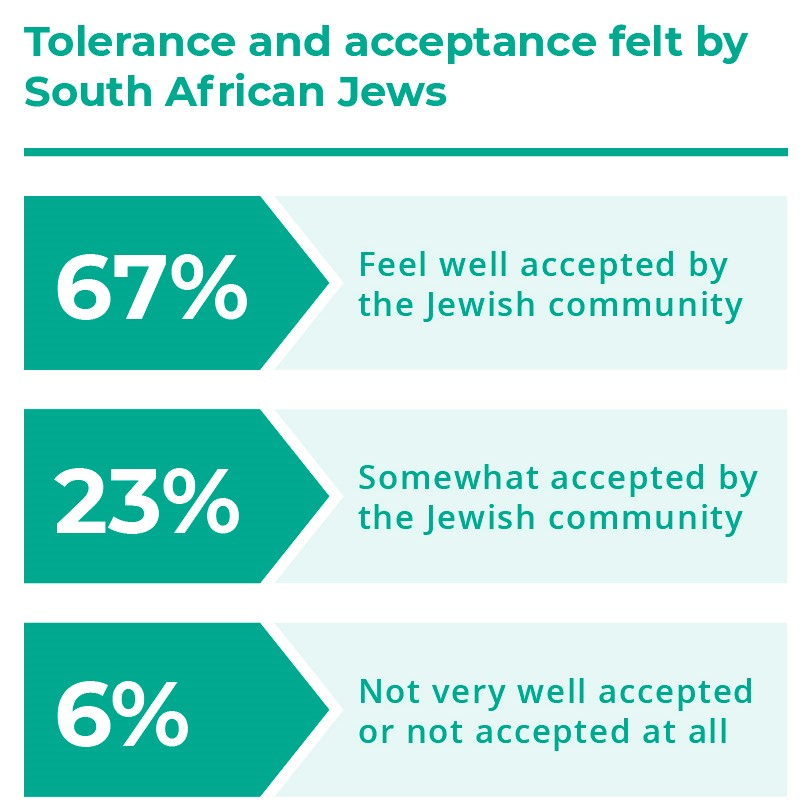click to dowload our latest edition
CLICK HERE TO SUBSCRIBE TO OUR NEWSLETTER


Published
4 years agoon
By
adminTALI FEINBERG
Furthermore, 20% of the respondents to the recently released Jewish Community Survey of South Africa (JCSSA) said that they felt discriminated against because they were Jewish in the 12 months prior to the study.
Ninety-two percent of respondents feel that anti-Israel sentiment in the country has increased over the past five years, and 74% feel the same about anti-Jewish sentiment. Just more than 10% say they have personally witnessed an anti-Semitic incident in the past year, while 8.8% have personally experienced an anti-Semitic attack in the past year, mostly involving verbal insult or harassment.
“We’re living in a moment where we are acutely sensitive to anti-Semitism, in large measure because of the resurgence of anti-Semitism in America, the failure of the Labour Party in the United Kingdom under Jeremy Corbyn to address anti-Semitism within its ranks, and violent attacks on Jews in France, Germany, and Belgium,” says Mendelsohn.
“This sensitivity has been accentuated by the very real surge of hate online, and particularly on social media. I suspect that this sensitivity has filtered into our local context. Jews, and particularly younger Jews, are less likely to tolerate the sort of occasional, petty, and niggling – but nonetheless unpleasant – incidents that they might have once laughed off or excused as examples of ignorance rather than hate. Younger Jews are also much more likely to be active on social media, and perhaps also much more assertive and confident about their Jewish identity.”
The South African Jewish Board of Deputies (SAJBD) reported at the end of January 2020 that the number of anti-Semitic incidents in South Africa had, in fact, dropped to a 15-year low in 2019.
Responding to the data, David Saks, the associate director of the SAJBD, says, “It’s essential to distinguish between actions [negative things done to Jews], discourse [prejudiced things said about Jews], and sentiment [negative attitudes towards/beliefs about Jews].”
It’s in the more easily measurably category of actions/incidents that South Africa has consistently recorded significantly lower rates of anti-Semitism than most other diaspora countries. Moreover, the nature of the incidents recorded overwhelmingly tends to be less grave than elsewhere. For example, the United Kingdom recorded 123 violent attacks on Jews in 2018 and 145 the previous year. South Africa recorded just one in each of those years,” says Saks.
“The JCSSA looks at the community’s perceptions of whether anti-Israel sentiment and anti-Jewish sentiment has increased over the past five years. The SAJBD wouldn’t dispute the fact that negative attitudes towards both may well have increased, or at least have been perceived to have increased during this period. However, it remains a demonstrable fact that up until now at least, negative sentiment isn’t leading to direct action to any great extent.
“It’s also worth pointing out that while still considered to be a cause for concern, anti-Semitism was listed by respondents as only ninth amongst the social and political issues said to be a problem in South Africa, well behind government corruption, crime, and unemployment. Anti-Israel sentiment is more of a problem, coming in at fifth, but that doesn’t come as a surprise.”
Two out of three respondents believe that anti-Semitism on the internet, in political life, and in the media are fairly or very big problems in South Africa today. Almost three quarters of respondents believed these three items have increased at least a little in the previous five years.
“Anti-Semitism on the internet is a global problem obviously,” Saks says, “and may well be on the rise. No academically rigorous studies have been conducted that show whether South Africa is any worse or better than other countries in this regard.”
Regarding political anti-Semitism, he says, “There have been a number of instances in the past year in which African National Congress spokespeople in the Western Cape, the Economic Freedom Fighters, and certain trade unions have made overtly anti-Semitic comments. It’s probably true therefore to say that this kind of anti-Semitic discourse is more common than in previous years, but it still surfaces only rarely, especially since the advent of the [Cyril] Ramaphosa presidency.
“With regard to anti-Semitism in the mainstream media, this is a misperception. In reality, it surfaces very rarely. My sense is that people are conflating anti-Israel bias with more overt forms of anti-Jewish prejudice.”
Last year, the anti-Semitism watchdog Anti-Defamation League’s (ADL’s) Global 100 survey reported that 47% of South Africans harbour anti-Semitic attitudes. The SAJBD called this report “deeply misleading and unreliable”.
Says Mendelsohn, “Contrary to the ADL’s study, I don’t think we live in a country where anti-Semitic views are pervasive. Most South Africans think very little about Jews on a regular basis.”
